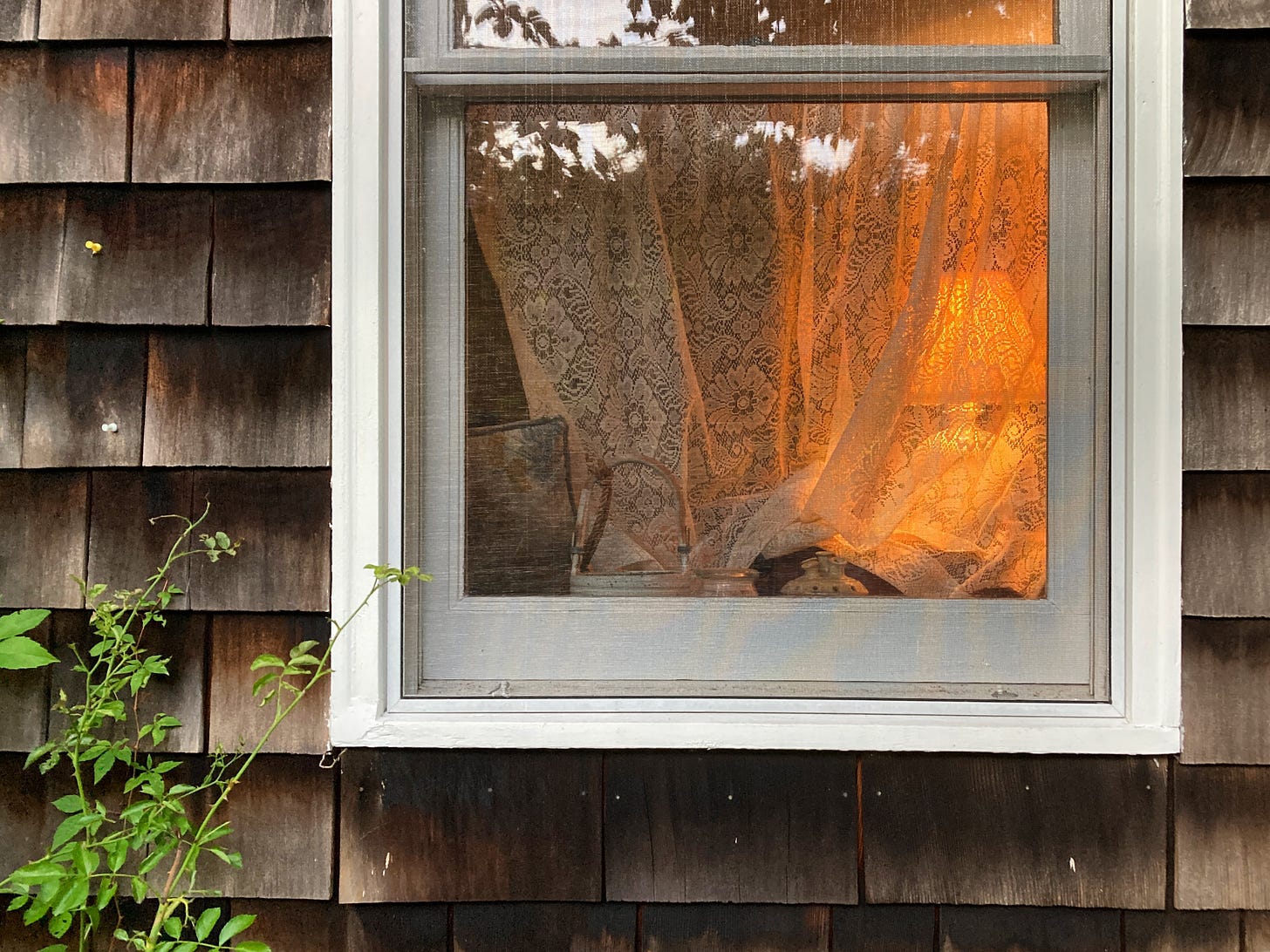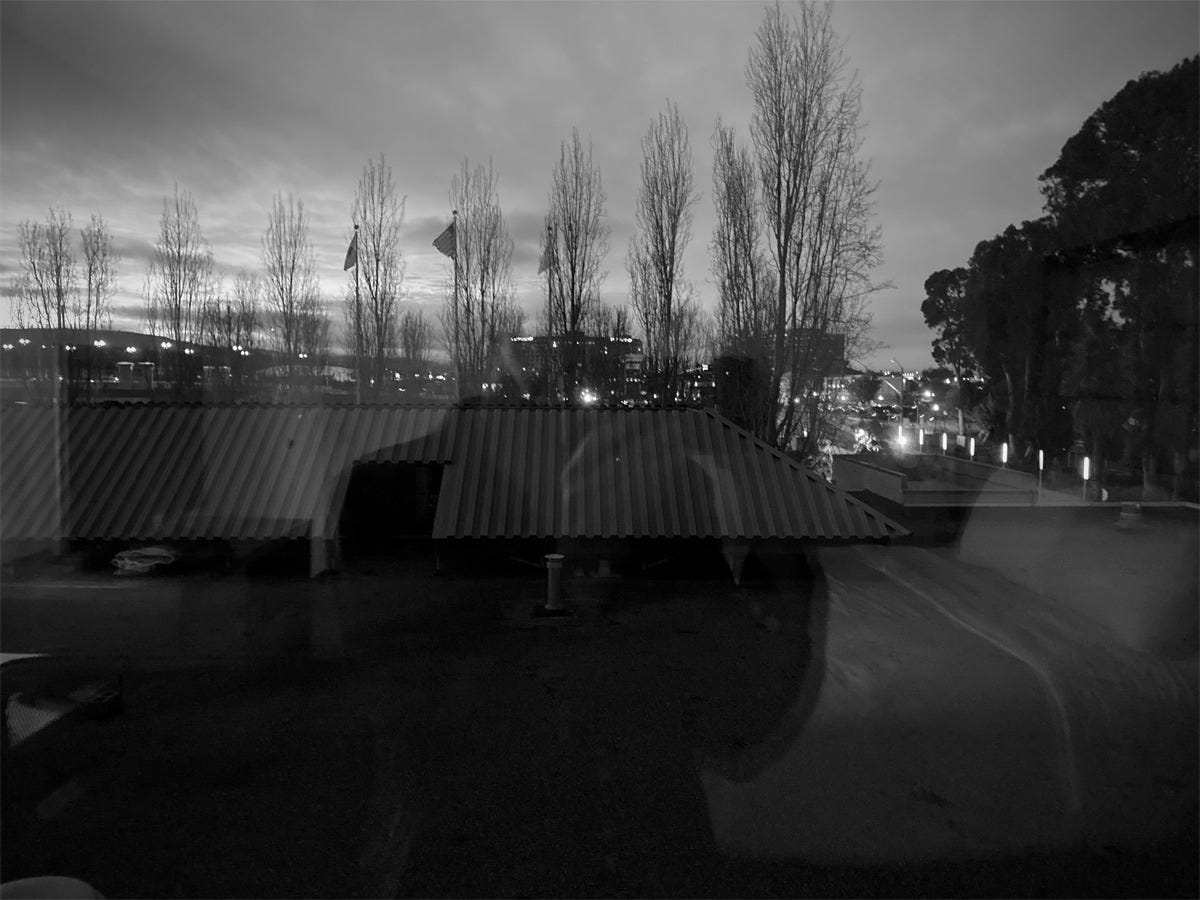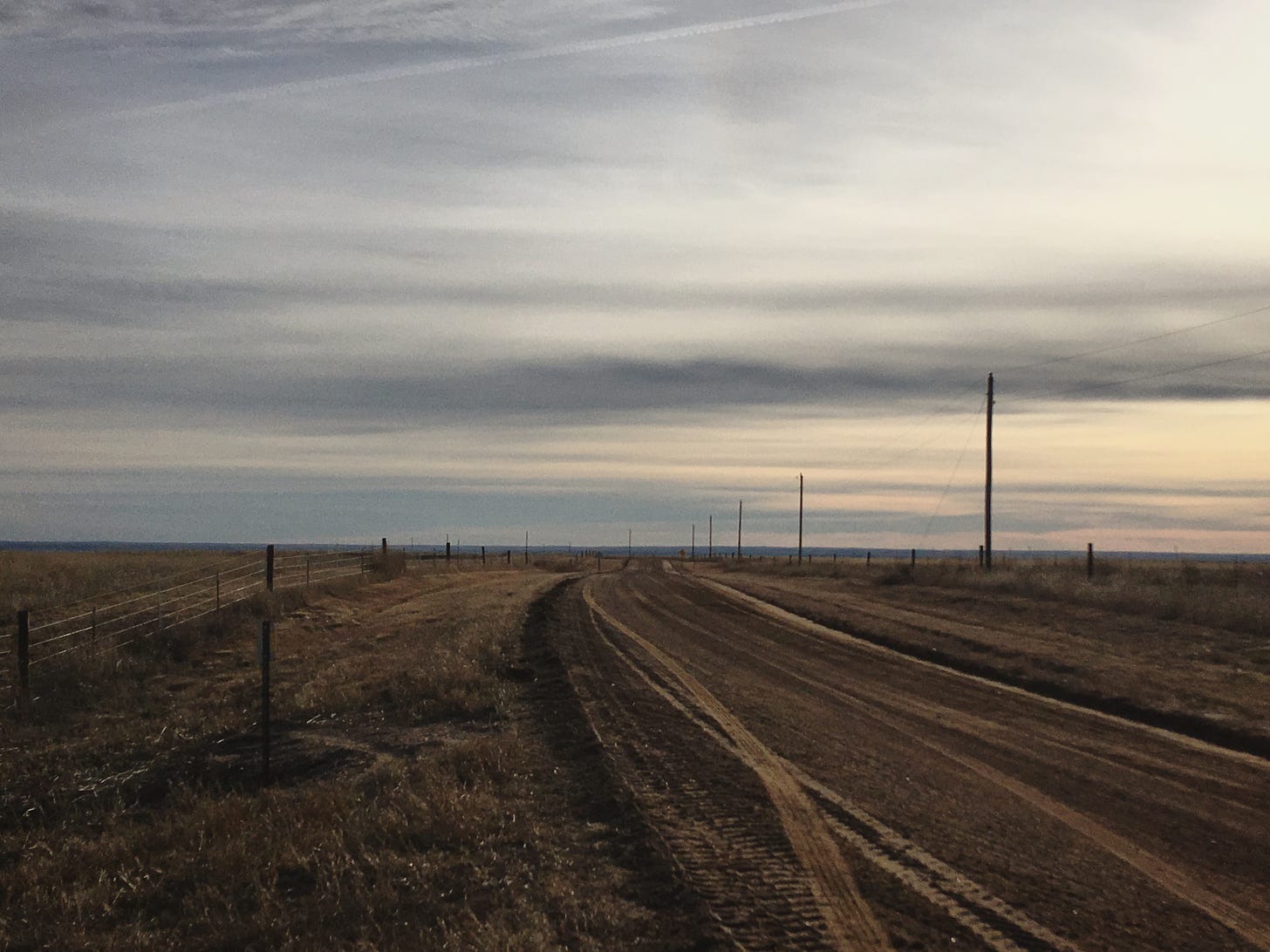Sometimes, an essay gets out of control. I may have begun writing this with a sense of where I was going and how the tension would crest and fall, and then finally how it would conclude, ideally in under 3,000 words (I know there aren’t many readers who want to stick around longer than that,) but it didn’t happen for me. Midstream, the piece began to wander, and the ending got further away. I’ve had this happen before. After a few weeks of writing, I had to just stop.
I stopped this piece, knowing it holds the seeds in it for more to come. What I had written already was over 5,100 words, which is definitely too much for one day’s reading. So, today’s piece is the first of two, with the latter half to come next Monday. Thank you for bearing with me… TM
The other night, I dreamed I was driven back to Kansas. I hadn’t driven myself–that’s an important distinction–but I didn’t know who it was exactly who left me there, outside the door of my old house. Before I could ask myself the question, the car had driven away.
Inside the house, I found my ex-husband, still alive, no gun in his hand. He had been waiting. He was so pleased, so relieved. He didn’t know where I had been, and he didn’t ask. I was here now, and he kept talking about plans and rushing around the house to show me things. He had a dog now, a German Shepherd. He thought I would be happy about this. The dog lay on the floor, looking mournfully up at me.
Santo hates German Shepherds, I thought. Somehow I both knew and didn’t know that this was the past. That I didn’t live here. That I had a new life, with Paul and with Santo, the chihuahua mix who thinks he can beat up big, mean-looking dogs.
My husband had cleaned the house. Was he my husband? I couldn’t remember if we were still married or not. He wanted me to know that he had vacuumed, with the real vacuum this time and not the flimsy battery-powered one. And he had stained the wooden porch out back. I walked over to a large window in this house that was similar to, but not the same as my old house. I looked out onto the back porch, the wood planks newly splotched with a strange orange-colored stain.
This was his best behavior. Better behavior than I’d ever seen, this strange desire to please me. And I knew, because I’d been gone, he was going to try to do everything right this time. I didn’t know how long it would last, until he decided I wasn’t leaving again and he could relax into his normal personality. But I could tell he wasn’t going to make it easy for me to leave. Looking out at the porch, I was overwhelmed by fatigue. Like there were lead plates sewn into the arms of my coat. Like there was concrete sewn into the hem of my pants. I tried to lift my hand to the window, but it was too difficult. He was still walking around behind me, talking. Oh God. How could I do this?
I had to get out of this marriage, but I didn’t know how to. How would I do it this time, if he offered me no excuses? If he opened no doors for me?
I woke up hot and pushed off the blankets in the dark. I could still feel the heaviness in my limbs. My head, heavy against the pillow. A thick weight in my chest.
I focused on the thin gray line of early morning light under the window curtain. A dream.
It’s been a while since I had that dream.
In the morning, as I walked to the subway, I was beginning to lay out an essay in my mind about how it felt to lose everything. I had acquiesced to carrying an umbrella, though the rain was barely a drizzle. I passed the dark early morning clothing stores on Bleecker Street, the wet outdoor tables at the too-hip coffee shop, and the steamy window of Janie’s Life Changing Baked Goods. All along, I was developing this idea—what does it mean to lose everything? Could I still access that radical silent moment just after I’d walked away from my marriage? I tried to recall those days in California, inside the freshly shaken etch-a-sketch of my life. As I turned onto 6th Avenue and glanced up at the marquee on the IFC Center to check out the new indie movie titles, I heard my morning forecaster calling out.
“Be careful, everyone!”
I don’t know his name yet, the homeless man who has become a fixture at the top of the West 4th Street subway station. He sits there some days in front of the Chinese bakery, tapping his feet on the concrete, and he calls out advice to the commuters rushing up and down the steps. This morning, he was yelling, “Be careful! The stairs are very slippery today, everyone! They are wet and slippery!” A dark exchange of raincoats running up and down past each other. The stutter of the crowd as people stopped to open their umbrellas at the top of the stairs.
I jogged down the steps and paused at the turnstile. “Careful, sir!” His voice was still booming down the passageway behind me. “It’s wet and slippery!”
I thought for a moment of his life, the man who camps at the West 4th Street Station. And it occurred to me that I had this wrong.
Stop. Start over. Because I don’t really know anything about losing everything. That isn’t what I’m talking about.
What am I talking about? Endings. The beauty of endings.
I’ve been thinking lately about that time in California, between the end of my marriage and the beginning of my life here in New York City. The floating time in between. I have a friend now who’s going through a breakup, and each time we meet up for coffee or a walk, I find myself referencing that time for him. Giving him advice—even though I claim not to believe in advice, I can’t help myself. I return again to the particular, special quality of that time in California. The days when my entire life, as I knew it, ended, and nothing had yet begun. It’s an extraordinary thing, to feel that you’ve lost everything. Even if you haven’t really.
I remember thinking, in California, that if there were ever a time to collapse, this was it. If I were ever going to fall completely apart, I could be excused for doing it now. I was no longer the publisher of anything. I had no home, only a suitcase of belongings. And I was no one’s wife. I knew that fact all through the core of me, in my bones and skin, before I had even boarded the flight. I was my own person again.
Is there someone else in your life? My ex-husband wrote to me. Among the other things he wrote in those long emails and text messages, he kept demanding to know who the “other person” was in my life.
I wrote back, The other person in my life is me.
He didn’t understand, but I hadn’t expected him to.
Did I hit you? He asked. Did I threaten you? He wrote to me with unanswerable questions. He didn’t understand why this moment was the end, suddenly, when nothing else had been. Had anything really been worse lately than before? Simple fatigue couldn’t be enough of a reason. The cumulative effect of acting out the same scenes, swallowing the same heart-starved loneliness—is that enough cause to end a marriage? If I had been hit, then okay, he would understand. Then I would have had a reason to leave.
I had wanted to be hit. That was a horrible realization, and at least a part of why I decided the marriage wasn’t salvageable. I was at the point of wishing for violence. I fantasized about being punched, kicked, thrown down the stairs. Not because I thought it’d be fun to experience, but because then I would know what story I was in. At least I knew what being hit meant. You learn about hitting when you’re a toddler. Hitting is bad. Hitting is beyond the pale.
Words, on the other hand, can be confusing. I had heard too many words.
Why was this finally the ending? I didn’t have a good answer. I should have left him on so many other days. After any number of awful scenes over the years. Some may have been as terrible as his actions in the days before I left. Even more terrible. But then, it’s impossible to measure terrible-ness. I hadn’t left on any of those days. And why?
A marriage is a churning work of machinery. Once you’re inside it, the mechanical whirring of your marriage, even your limping unhappy marriage, operates in perpetual motion, all through the day and night. Without lifting a finger, you get carried along in its works. And so you don’t fall asleep thinking, tomorrow is the day it all stops. You don’t wake up and think, today I will end everything. Instead you think, I have to do the laundry tomorrow. You think, we have that doctor’s appointment on Wednesday. How could you possibly go anywhere? There are dishes in the sink.
I used to wonder about the algebra of unhappiness. How bad should it get before I can finally go? And how long does it need to be that bad? If I’m miserable only 20% of the time, and happy maybe 5%, and otherwise just dissatisfied… can I leave? I would puzzle over this math in quiet, pained moments. But somehow, for years, the equation didn’t lead anywhere.
It takes a true seismic shock in order to rattle yourself out of the day-to-day complacency of a marriage. I knew being hit might do it, assuming he didn’t apologize too quickly after, and assuming I had a place to go. But then, he never hit me.
So why did our marriage end when it did? It ended because he said, “I think we should get a divorce.” Not for the first time, but finally at the moment when I was ready to hear it. It ended because he held a bag with a gun in it, and told me what that gun meant, and then he walked out the door. And because I didn’t have any important appointments that week. And the sink was clean.
We must have had a thousand little endings over the course of our marriage. I was the only one to notice them. Each little unexpected cruelty, after which some part of me broke from him and never returned. I can still feel the sting of it. The hot, flustered confusion as he explained to me exactly what I had done wrong this time.
“Why couldn’t you just shut up?” He was standing in his office. It was a winter evening, early in our marriage. “Couldn’t you tell no one was interested?” We had just returned from dinner with our friends across the street. “I was trying to signal to you to just stop. No one cares about the—what was it? It wasn’t the Industrial Revolution. The—”
“Agrarian,” I said, stumbling a little over the word. “Like agriculture. It was a joke. The Agrarian Revolution was earlier.”
The look on his face.
“It doesn’t matter,” I went on. “It just seemed funny because you were talking about the gross old things in the back of the fridge, and I imagined them evolving over time, and learning how to grow crops, and some of them became little feudal lords and others were moldy little peasants, and–” I stopped.
“Well, everyone clearly thought you were crazy. It was embarrassing.”
“Embarrassing.” I repeated it. I stood very still, closing my palm over the knife edge of this conversation. Feeling it sink in.
“Yes, you were embarrassing. You embarrassed me. You need to listen when I tell you to stop talking.”
And another piece of me left.
He noticed that I was continually less of myself over time. That the aspects of my personality he’d singled out for ridicule were disappearing. In his eyes, this was a gift he’d given me, this whittled down version of myself. He complimented me on the new blonde hair color he’d chosen. The softer, quieter voice. The way I took up less and less space in any room over time, until, in the months before I left, each individual bone of my ribcage was visible under my skin, and all my pants hung loose off my hips. After ten years of subtraction, I was nearly perfect in his eyes.
“You’re almost perfect,” he told me on the good days. He would pinch his fingers around my waist and down over my hips until he found some bit of skin he could pull away from the rest. “Not quite perfect yet, though.” He smiled, so maybe I was meant to take it as a joke.
By then, it was hard for me to interpret him. Or maybe I made less of an effort. I lived, increasingly, in the jewelbox of my mind, where I kept company with the parts of myself he’d rejected. He didn’t understand that, in the pauses between sentences, the second I turned away from him, as I looked to the car window, or walked out of the room, I had gone somewhere inside. I was in my precious interior room, an armored place, where I had learned how to love my own company. I longed for that inner place whenever I wasn’t there.
I had no energy left to care about him. In those last months, I was connected to my daily life only by the longest, loosest threads. I did what needed to be done, I kept the details of our lives in order, but I retreated inward at the first sign of his anger. I no longer asked him to change the channel on the television set or turn down the volume. I just left the room. I stayed in my office for hours every day, working on the next issue of the journal we had once published together, and which I now published alone. I played my guitar to myself quietly and lived in long interludes of fantasy.
Later, in California, as I sifted through the days and weeks and months of “before,” I tried to single out the moment I knew I would leave. I could never decide on any single event. Only a long, continuous string of them. A decade-long pattern of endings, the snipped threads along a seam. Starting with the pills he showed me on our first night together. Culminating with the gun the day before I left. Between those two moments, thousands of others.
One of the last threads fell the day he said, “You know, if your dad hadn’t died, we wouldn't have gotten married.”
It was less than a month before I left. We were in the car driving to Medicine Lodge, Kansas for his follow up appointment with the doctor. His health problems had already been figured out—after months in which he’d convinced himself otherwise, we now knew he wasn’t dying of anything. This was going to be the last doctor’s appointment for a while. His mother was settled into her new nursing home in Kansas, and I had arranged her finances with the local bank. I had finished the last pages of the forthcoming online issue. For the first time in a year, I had nothing pressing to do with my time. No tasks on my calendar. It was a pause after a season of tumult—we had discussed taking a winter trip to New Mexico at some point, but in an absent way that meant I wasn’t really planning for it to happen—and then he said this thing. This insane and startlingly true thing.
If my father hadn’t died, we wouldn’t be married. To know what this sentence means, you would have to know who my dad was to me. The one dead person I wanted alive, of all the dead people in the universe. If he were still alive, then apparently the past decade would have been a near miss. Something that almost, but didn’t happen.
My dad—even now, a part of me gasps with the pain of missing my dad. He had told me not to move to that little town in Kansas. He’d told me I was wasting my time on this relationship. My ex-husband hated my dad when my dad was still alive. Then, he forgot how he’d hated him as soon as he was gone. If my father hadn’t died… no, he was right. There was no question. How had I not thought about this before?
I don’t know if he knew what those words meant. He said it so casually as he drove down the highway. It was a gray November day, striated clouds overhead and a long straight line of highway ahead of us. I paused, trying to decide whether this was a test. It may well have been. Uncertain, I responded, “I guess.” Then I fell silent.
I took that sentence away with me, carried it deep into the conversation inside my mind. If it were true—and I knew it was true—then this meant something profound.
It was one of the moments that might have been the deciding moment. A strong contender, as I weighed all the little endings for their fatal effect. It was at least one of the moments in which leaving became inevitable.
If you enjoyed this post, hit the ♡ to let us know.
If it gave you any thoughts, please leave a comment.
If you think others would enjoy it, hit re-stack or share:
If you’d like to read more:
And if you’d like to help create more Juke, upgrade to a paid subscription (same button above). Otherwise, you can always help with a one-time donation via Paypal or Venmo.








The more you reveal about him, the more brutal and manipulative he appears. He did indeed hit you ... many times ... with the weapon you understand the most. Words. What's more, your sense of humor, shown in your marvelous story about the moldy sludge in the fridge becoming a civilization, an Agrarian Revolution, is just too intelligent for him or your neighbors to understand. Jeff and I do that all the time between us. He'll say something absurd, I'll add to it, and back and forth, becoming more satirical. Few people grok that kind of humor. It's creative and brilliant. He was not worthy of you.
Very eager for part 2...🥲